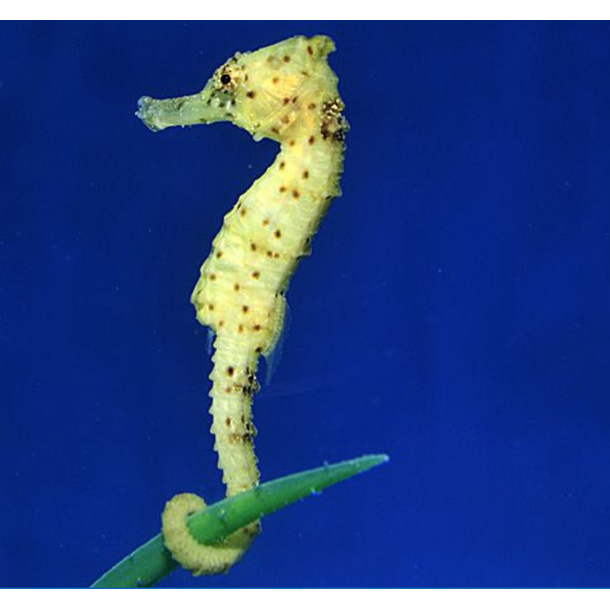Kuda Seahorse
You will earn 63 Points
The Kuda Seahorse is a moderately sized seahorse. This species ranges in colour from black to yellow. Some individuals may have spots or a darker band or bars on their body.
These social fish thrive when kept as a mated pair or in small groups in a species-only aquarium. A 200 L aquarium is sufficient for a single pair. Add 50 L to the size of the aquarium for each additional pair. Spray bars may be used to create gentle flow while eliminating stagnant areas in the aquarium. Seahorses are not strong swimmers, preferring to use their prehensile tails to hitch to branching live rock, algae, or artificial decorations. Seahorses are less likely to contract Vibrio bacterial infections if the temperature is not allowed to exceed 24°C. This is particularly important if the aquarium contains other species of Syngnathids. It is also necessary to remove detritus and uneaten food daily. Calcium and alkalinity levels must be monitored and maintained to keep their bony plates healthy.
They may be kept with small, shy fish such as small gobies, pipefish, dragonets, and firefish. But aggressive, territorial, or fast-moving fish do not make good companions. Seahorses can be harmed by anemones and corals with stinging tentacles or corals that are large enough to consume them, such as brain corals. While sea fans, and other branching corals may be safe for seahorses, they can be irritated or damaged by a seahorse that continually hitches to them. Crabs and clams may pinch a seahorse causing a wound that could lead to secondary infections. Small ornamental crustaceans may be consumed by the seahorses.
Avoid fish that will out-compete the seahorse for food. These captive-bred seahorses are accustomed to frozen Mysis shrimp, making them a smart alternative to their wild-caught counterparts. They will also feed upon amphipods and other small crustaceans found in live rock. They will also accept vitamin-enriched adult brine shrimp, but this should not make up a majority of their diet. They are slow, deliberate feeders and prefer two or more small feedings per day.
Seahorses are probably the most recognizable fish in the world due to their unusual appearance and habits. They are very social, curious fish that are fun to watch while they interact with their surroundings, each other, and even their owners.
